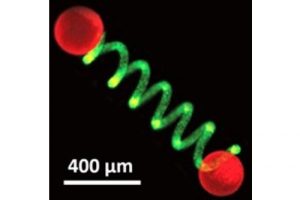A Max Planck-led team of international scientists with an interest in protoliving technologies, has recently published research which paves the way to building new semi-autonomous devices with potential applications in miniaturized soft robotics, microscale sensing and bioengineering.
In a series of experiments, the researchers successfully embedded tens of thousands of artificial cell-like entities (protocells) within helical filaments of a polysaccharide hydrogel to produce tiny free-standing springs that are chemically powered from within.

Professor Stephen Mann, co-Director of the Max Planck Bristol Centre for Minimal Biology (MPBC) at Bristol, said: “We have a longstanding interest in protoliving technologies. One key challenge is how to interface protocell communities with their environment to produce functional relationships. The new work provides a step in this direction as it illustrates how endogenous chemical processes can be coupled to their energized surroundings to produce a programmable chemo-mechanical micro-system”.
Dr Ning Gao, also at the MPBC and School of Chemistry at the University of Bristol added: “We hope that our approach will motivate the fabrication of new types of soft adaptive microstructures that operate via increased levels of autonomy.” [Read the full article on the University of Bristol news page]
Paper:
“Chemical-mediated translocation in protocell-based microactuators,’ by Gao N, Li M, Tian L, Patil A J, Kumar P B V V Sand Mann S in Nature Chemistry.

